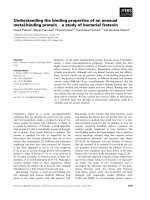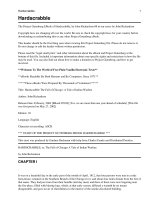Held Fast For England A Tale of the Siege of Gibraltar (1779-83) pdf
Bạn đang xem bản rút gọn của tài liệu. Xem và tải ngay bản đầy đủ của tài liệu tại đây (774.55 KB, 223 trang )
Chapter 1
Chapter 2
Chapter 3
Chapter 4
Chapter 5
Chapter 6
Chapter 7
Chapter 8
Chapter 9
Chapter 10
Chapter 11
Chapter 12
Chapter 13
Chapter 14
Chapter 15
Chapter 16
Chapter 17
Chapter 1
Chapter 2
Chapter 3
Chapter 4
Chapter 5
Chapter 6
Chapter 7
Chapter 8
Chapter 9
Chapter 10
Chapter 11
Chapter 12
Chapter 13
Chapter 14
1
Chapter 15
Chapter 16
Chapter 17
Held Fast For England, by G. A. Henty,
The Project Gutenberg eBook, Held Fast For England, by G. A. Henty, Illustrated by Gordon Browne
This eBook is for the use of anyone anywhere at no cost and with almost no restrictions whatsoever. You may
copy it, give it away or re-use it under the terms of the Project Gutenberg License included with this eBook or
online at www.gutenberg.org
Title: Held Fast For England A Tale of the Siege of Gibraltar (1779-83)
Author: G. A. Henty
Release Date: June 9, 2007 [eBook #21788]
Language: English
Character set encoding: ISO-646-US (US-ASCII)
***START OF THE PROJECT GUTENBERG EBOOK HELD FAST FOR ENGLAND***
E-text prepared by Martin Robb
Note: Project Gutenberg also has an HTML version of this file which includes the original illustrations. See
21788-h.htm or 21788-h.zip: ( or
( />HELD FAST FOR ENGLAND:
A Tale of the Siege of Gibraltar (1779-83)
by
G. A. HENTY.
Contents
Preface.
Held Fast For England, by G. A. Henty, 2
Chapter 1
: "Something Like An Adventure."
Chapter 1 3
Chapter 2
: A Great Change.
Chapter 2 4
Chapter 3
: An Unexpected Journey.
Chapter 3 5
Chapter 4
: Preparations For A Voyage.
Chapter 4 6
Chapter 5
: A French Privateer.
Chapter 5 7
Chapter 6
: The Rock Fortress.
Chapter 6 8
Chapter 7
: Troubles Ahead.
Chapter 7 9
Chapter 8
: The Siege Begins.
Chapter 8 10
Chapter 9
: The Antelope.
Chapter 9 11
Chapter 10
: A Cruise In A Privateer.
Chapter 10 12
Chapter 11
: Cutting Out A Prize.
Chapter 11 13
Chapter 12
: A Rich Prize.
Chapter 12 14
Chapter 13
: Oranges And Lemons.
Chapter 13 15
Chapter 14
: A Welcome Cargo.
Chapter 14 16
Chapter 15
: Bob's Mission.
Chapter 15 17
Chapter 16
: A Cruise In The Brilliant.
Chapter 16 18
Chapter 17
: The Floating Batteries.
Illustrations
Bob and his Companions surprise the Burglars. View of Gibraltar from the Mediterranean. View of Gibraltar
from the Bay. The Professor gets excited. The Rock and Bay of Gibraltar. 'The old gentleman is a brick,'
exclaimed Gerald. Bob swims off to the Spanish Warship. They found the two Spanish mates playing at cards.
They find Boxes of Silver in the Lazaretto. Bob receives a Commission from the Governor.
Preface.
The Siege of Gibraltar stands almost alone in the annals of warfare, alike in its duration and in the immense
preparations made, by the united powers of France and Spain, for the capture of the fortress. A greater number
of guns were employed than in any operation up to that time; although in number, and still more in calibre, the
artillery then used have in, modern times, been thrown into the shade by the sieges of Sebastopol and Paris.
Gibraltar differs, however, from these sieges, inasmuch as the defence was a successful one and, indeed, at no
period of the investment was the fortress in any danger of capture, save by hunger.
At that period England was not, as she afterwards became, invincible by sea; and as we were engaged at the
same time in war with France, Spain, Holland, and the United States, it was only occasionally that a fleet
could be spared to bring succour and provisions to the beleaguered garrison. Scurvy was the direst enemy of
the defenders. The art of preserving meat in tins had not been discovered, and they were forced to subsist
almost entirely upon salt meat. During the first year of the siege the supply of fresh vegetables was scanty, in
the extreme, and the garrison consequently suffered so severely, from scurvy, that at one time scarcely half of
the men of the garrison were strong enough to carry a firelock, and perform their duty. The providential
capture of a vessel laden with oranges and lemons checked the ravages of the scourge; and the successful
efforts of the garrison to raise vegetables prevented it from ever, afterwards, getting a firm hold upon them.
In such a siege there was but little scope for deeds of individual gallantry. It was a long monotony of hardship
and suffering, nobly endured, and terminating in one of the greatest triumphs ever recorded in the long roll of
British victories.
G. A. Henty.
Chapter 17 19
Chapter 1
: "Something Like An Adventure."
Had Mr. Tulloch, the headmaster and proprietor of a large school at Putney, been asked which was the most
troublesome boy in his school, he would probably have replied, without hesitation, "Bob Repton."
But, being a just and fair-minded man, he would have hastened to qualify this remark, by adding:
"Most troublesome, but by no means the worst boy. You must understand that. He is always in scrapes,
always in mischief. In all my experience I have never before come across a boy who had such an aptitude for
getting into trouble; but I have nothing else to say against him. He is straightforward and manly. I have never
known him to tell a lie, to screen himself. He is an example to many others in that way. I like the boy, in spite
of the endless trouble he gives, and yet there is scarcely a day passes that I am not obliged to cane him; and
even that does him no good, as far as I can see, for he seems to forget it, five minutes after it is over. I wonder,
sometimes, if he has really got hardened, and doesn't feel it.
"He is sharp, and does his lessons well. I have no difficulty with him, on that score; but he is a perfect imp of
mischief."
With such characteristics, it need hardly be said that Bob Repton was one of the most popular boys at
Tulloch's school.
School life was, in those days for it was in August, 1778, that Bob was at Tulloch's a very different thing to
what it is, at present. Learning was thrashed into boys. It was supposed that it could only be instilled in this
manner; and although some masters were, of course, more tyrannical and brutal than others, the cane was
everywhere in use, and that frequently. Lads, then, had far less liberty and fewer sports than at present; but as
boys' spirits cannot be altogether suppressed, even by the use of the cane, they found vent in other ways, and
there was much more mischief, and more breaking out of bounds, than now take place. Boys were less trusted,
and more harshly treated; in consequence of which there was a kind of warfare between the masters and the
boys, in which the masters, in spite of their canes, did not always get the best of it.
Bob Repton was nearly fifteen. He was short, rather than tall for his age, but squarely built and strong. His
hair could never be got to lie down, but bristled aggressively over his head. His nose was inclined to turn up,
his gray eyes had a merry, mischievous expression, and his lips were generally parted in a smile. A casual
observer would have said that he was a happy-go-lucky, merry, impudent-looking lad; but he was more than
this. He was shrewd, intelligent, and exceptionally plucky; always ready to do a good turn to others, and to
take more than his fair share of blame, for every scrape he got into. He had fought many battles, and that with
boys older than himself, but he had never been beaten. The opinion, generally, among the boys was that he did
not feel pain and, being caned so frequently, such punishment as he got in a fight was a mere trifle to him.
He was a thorn in the side of Mr. Purfleet, the usher who was generally in charge of the playground; who had
learned by long experience that, whenever Bob Repton was quiet, he was certain to be planning some special
piece of mischief. The usher was sitting now on a bench, with a book in his hand; but his attention was, at
present, directed to a group of four boys who had drawn together in a corner of the playground.
"There is Repton, again," he said to himself. "I wonder what he is plotting, now. That boy will be the death of
me. I am quite sure it was he who put that eel in my bed, last week; though of course, I could not prove it."
Mr. Purfleet prided himself on his nerve. He had been telling the boys some stories he had read of snakes, in
India; among them, one of an officer who, when seated at table, had felt a snake winding itself round his leg,
and who sat for several minutes without moving, until some friends brought a saucer of milk and placed it
Chapter 1 20
near, when the snake uncurled itself and went to drink.
"It must have required a lot of nerve, Mr. Purfleet," Bob Repton had said, "to sit as quiet as that."
"Not at all, not at all," the usher replied, confidently. "It was the natural thing to do. A man should always be
calm, in case of sudden danger, Bob. The first thought in his mind should be, 'What is this?' the second, 'What
had best be done, under the circumstances?' and, these two things being decided, a man of courage will deal
coolly with the danger. I should despise myself, if I were to act otherwise."
It was two nights later that the usher, having walked down between the two rows of beds in the dormitory, and
seeing that all the boys were quiet, and apparently asleep, proceeded to his own bed, which was at the end of
the room, and partly screened off from the rest by a curtain. No sooner did he disappear behind this than half a
dozen heads were raised. An oil lamp burned at the end of the room, affording light for the usher to undress;
and enabling him, as he lay in bed, to command a general, if somewhat faint view of the dormitory. Five
minutes after Mr. Purfleet had disappeared behind the curtain, the watching eyes saw the clothes at the end of
the bed pulled down, and caught a partial view of Mr. Purfleet as he climbed in. A second later there was a
yell of terror, and the usher leapt from the bed. Instantly, the dormitory was in an uproar.
"What is it, Mr. Purfleet what is the matter, sir?" and several of the boys sprang from their beds, and ran
towards him; the only exceptions to the general excitement being the four or five who were in the secret.
These lay shaking with suppressed laughter, with the bedclothes or the corner of a pillow thrust into their
mouths, to prevent them from breaking out into screams of delight.
"What is it, sir?"
It was some time before the usher could recover himself sufficiently to explain.
"There is a snake in my bed," he said.
"A snake!" the boys repeated, in astonishment, several of the more timid at once making off to their beds.
"Certainly, a snake," Mr. Purfleet panted. "I put my legs down, and they came against something cold, and it
began to twist about. In a moment, if I had not leapt out, I should no doubt have received a fatal wound."
"Where did it come from?"
"What is to be done?"
And a variety of other questions burst from the boys.
"I will run down and get three or four hockey sticks, Mr. Purfleet," one of the elder boys said.
"That will be the best plan, Mason. Quick, quick! There, do you see it moving, under the clothes?"
There was certainly something wriggling, so there was a general movement back from the bed.
"We had better hold the clothes down, Mr. Purfleet," Bob Repton said, pushing himself forward. "If it were to
crawl out at the top, and get on to the floor, it might bite a dozen of us. I will hold the clothes down tight, on
one side, if someone will hold them on the other."
One of the other boys came forward, and the clothes were stretched tightly across the bed, by the pillow. In a
minute or two, Mason ran up with four hockey sticks.
Chapter 1 21
"Now, you must be careful," Mr. Purfleet said, "because if it should get out, the consequences might be
terrible. Now, then, four of you take the sticks, and all hit together, as hard as you can now."
The sticks descended together. There was a violent writhing and contortion beneath the clothes, but the blows
rained down fast and, in a very short time, all movement ceased.
"It must be dead, now," Bob Repton said. "I think we can look at it now, sir."
"Well, draw the clothes down very gently; boys, and be ready to strike again, if you see the least movement."
The clothes were drawn down, till the creature was visible.
"It must be a cobra," the usher said, looking at it from a distance. "It is thick and short. It must have escaped
from somewhere. Be very careful, all of you."
Mason approached cautiously, to get a nearer view; and then exclaimed:
"Why, sir, it is an eel!"
There was a moment's silence, and then a perfect yell of laughter from the boys. For a moment the usher was
dumbfounded, then he rallied.
"You will all go to your beds, at once," he said. "I shall report the matter to Mr. Tulloch, in the morning."
The boys retired, laughing, to their beds; but above the din the usher heard the words, in a muffled voice:
"A man should always be calm, in sudden danger."
Another voice, equally disguised, said:
"Yes, he should first ask himself 'What is this?' then 'What had best be done, under the circumstances?'"
A third voice then took it up:
"It follows that a man of courage will deal coolly with the danger."
Then there was a chorus of half a dozen voices:
"I should despise myself, if I were to act otherwise."
"Silence!" the usher shouted, rushing down the line between the beds. "I will thrash the first boy who speaks."
As Mr. Purfleet had one of the hockey sticks in his hand, the threat was sufficient to ensure silence.
To the relief of the two or three boys engaged in the affair, Mr. Purfleet made no report in the morning. Mr.
Tulloch by no means spared the cane, but he always inquired before he flogged and, as the usher felt sure that
the snake story would be brought forward, by way of excuse for the trick played upon him, he thought it better
to drop it; making a mental note, however, that he would get even with Bob Repton, another time for he
made sure that he was at the bottom of the matter, especially as he had been one of those who had listened to
the snake story.
Mr. Purfleet was held in but light respect by the boys. He was a pale young man, and looked as if he had been
Chapter 1 22
poorly fed, as a boy. He took the junior classes, and the belief was that he knew nothing of Latin.
Moffat, who took the upper classes, was much more severe, and sent up many more boys to be caned than did
the junior usher; but the boys did not dislike him. Caning they considered their natural portion, and felt no ill
will on that account; while they knew that Mr. Moffat was a capital scholar and, though strict, was always
scrupulously just. Above all, he was not a sneak. If he reported them, he reported them openly, but brought no
accusation against them behind their back; while Mr. Purfleet was always carrying tittle tattle to the
headmaster. There was, therefore, little gratitude towards him for holding his tongue as to the eel; for the boys
guessed the real reason of his silence, and put it down to dread of ridicule, and not to any kindliness of feeling.
"Purfleet would give sixpence to know what we are talking about, Bob," one of the group talking in the corner
of the playground said.
"It is worth more than that, Jim; still, we shall have to be extra careful. He suspects it was our lot who played
him the trick about the eel, and he will do his best to catch us out, in something.
"Well, as I was saying, Johnny Gibson has got a first-rate dog for rabbits, and he says there are lots of them up
on the Common. I told him that I would come, and I expected two or three more; and we would meet him at
the top of the hill, at four o'clock tomorrow morning. It will be getting light by that time. Of course, we shall
get out in the usual way, and we can be back by half past six, and no one will be any the wiser. Old Thomas
never comes down till a quarter to seven. I have heard him a dozen times. He just comes down in time to ring
the bell for us to get up."
"Oh, I ain't afraid of Thomas," one of the others said, "but I am afraid of Purfleet."
"There need be no fear about him. He never wakes till the bell rings, and sleeps like a top. Why, he didn't
wake, the other morning, when we had a scrimmage and you tumbled out of bed. Besides, we all sleep at the
other end of the room and, even if he did wake up in the night, he wouldn't notice that we had gone; especially
if we shoved something in the bed, to make a lump.
"My only fear is that we shan't wake. We ought to keep watch till it's time to get up, but I am sure we
shouldn't keep awake. We must all make up our minds to wake at three, then one of us will be sure to do it.
And mind, if one wakes, he must promise not to go to sleep again before he hears the hall clock strike, and
knows what time it is. If it is before three, he can go off to sleep again. That way, one of us is sure to be
awake, when it strikes three."
"I say, shan't we just be licked, if we are found out, Bob?"
"Of course we shall; but as we get licked pretty well every day, that won't make much difference, and we shall
have had awful fun. Still, if any of you fellows don't like it, don't you go. I am going, but I don't want to
persuade any of you."
"Of course we are going, if you are going, Bob. What are we going to do with the rabbits?"
"Oh, I settled Johnny Gibson should keep them. He is going to bring his dog, you know; besides, what could
we do with them? We can't cook them, can we?"
As it was clear to all the party that this could not be managed, no objection was raised to this disposal of their
game.
Bob Repton slept but little that night. They went to bed at eight, and he heard every hour strike after nine;
dozing off occasionally, and waking up, each time, convinced that the clock would strike three next time. At
Chapter 1 23
last he heard the three welcome strokes, and at once got up and went to the beds of the other three boys.
They were all sound asleep, and required some shaking before they could be convinced that it was time to get
up. Then each boy put his bolster in his bed, rolled up his night shirt into a ball and laid it on the pillow, and
then partly covered it up with the clothes. Then they slipped on their shirts, breeches, and stockings and,
taking their jackets and shoes in their hand, stole out of the door at their end of the room, and closed it behind
them. They then crept downstairs to the room where their caps were kept, put on these and their jackets, and
each boy got a hockey stick out of the cupboard in the corner in which they were kept. Then they very
cautiously unfastened the shutter, raised the window, and slipped out. They pulled the shutter to behind them,
closed the window, and then put on their shoes.
"That is managed first rate," Bob said. "There wasn't the least noise. I made sure Wharton would have
dropped his shoes."
"Why should I drop them, more than anyone else?" Wharton asked in an aggrieved voice.
"I don't know, Billy. The idea occurred to me. I didn't think anyone else would do it, but I quite made up my
mind that you would."
"Well, I wish you wouldn't be so fast about making up your mind, then," Wharton grumbled. "I ain't more
clumsy than other people."
"You are all right," Jim Sankey put in. "Bob's only joking."
"Well, he might as well joke with somebody else, Jim. I don't see any joke in it."
"No, that is where the joke is, Billy," Bob said. "If you did see the joke, there wouldn't be any joke in it.
"Well, never mind, here is the walnut tree. Now, who will get over first?"
The walnut tree stood in the playground near the wall, and had often proved useful as a ladder to boys at
Tulloch's. One of its branches extended over the wall and, from this, it was easy to drop down beyond it. The
return was more difficult, and was only to be accomplished by means of an old ivy, which grew against the
wall at some distance off. By its aid the wall could be scaled without much difficulty, and there was then the
choice of dropping twelve feet into the playground, or of walking on the top of the wall until the walnut tree
was reached.
Tulloch's stood some little distance along the Lower Richmond Road. There were but one or two houses,
standing back from the road between it and the main road up the hill, and there was little fear of anyone being
abroad at that time in the morning. There was, as yet, but a faint gleam of daylight in the sky; and it was dark
in the road up the hill, as the trees growing in the grounds of the houses, on either side, stretched far over it.
"I say," Jim Sankey said, "won't it be a go, if Johnny Gibson isn't there, after all?"
"He will be up there by four," Bob said, confidently. "He said his father would be going out in his boat to fish,
as soon as it began to be daylight because the tide served at that hour and that he would start, as soon as his
father shoved off the boat.
"My eye, Jim, what is that ahead of us? It looks to me like a coach."
"It is a coach, or a carriage, or something of that sort."
Chapter 1 24
"No, it isn't, it is a light cart. What can it be doing here, at this hour? Let us walk the other side of the road."
They crossed to the left, as they got abreast of the cart. A man, whom they had not noticed before, said
sharply:
"You are about early."
"Yes, we are off to work," Bob replied, and they walked steadily on.
"He couldn't see what we were like," Jim Sankey said, when they had got a hundred yards further.
"Not he," Bob said. "I could not make out his figure at all, and it is darker on this side of the road than it is on
the other.
"I say, you fellows, I think he is up to no good."
"What do you mean, Bob?"
"Well, what should a cart be standing on the hill for, at this time in the morning? That's Admiral Langton's, I
know; the door is just where the cart was stopping."
"Well, what has that got to do with it, Bob? The cart won't do him any harm."
"No, but there may be some fellows with it, who may be breaking into his house."
"Do you think so, Bob?"
"Well, it seems likely to me it may be his house, or one of the others."
"Well, what are we to do, Bob?"
"I vote we see about it, Jim. We have pretty nearly half an hour to spare, now, before Johnny Gibson will
come along. We have got our hockey sticks, you know."
"But suppose there shouldn't be any men there, Bob, and we should be caught in the grounds; They would
think we were going to steal something."
"That would be a go," Bob said, "but there isn't likely to be anyone about, at half past three; and if there were,
I don't suppose he would be able to catch us. But we must risk something, anyhow. It will be a bit of fun, and
it will be better than waiting at the top of the hill, with nothing to do till, Johnny Gibson comes."
They were now past the wall in front of Admiral Langton's, and far out of sight of the man in the cart.
"There is some ivy on this wall," Bob said. "We can climb over it, by that. Then we will make our way along,
until we can find some place where we can climb over into the admiral's garden."
"Perhaps there are some dogs about," Wharton objected.
"Well, if there are, they are most likely chained up. We must risk something.
"Well, here goes. If you don't like it, Wharton, you can stay behind."
Chapter 1 25









